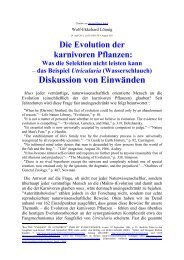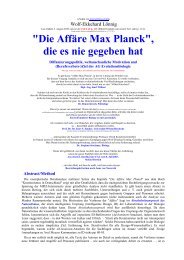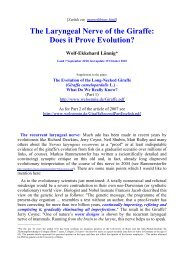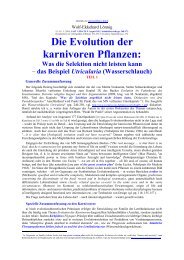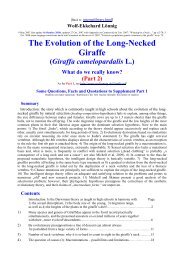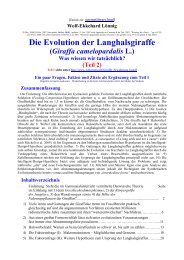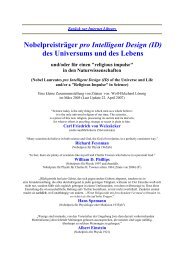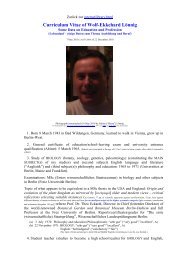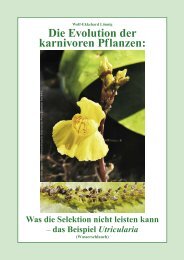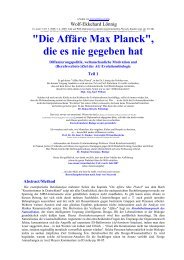The Evolution of the Long-Necked Giraffe (pdf) - Wolf-Ekkehard Lönnig
The Evolution of the Long-Necked Giraffe (pdf) - Wolf-Ekkehard Lönnig
The Evolution of the Long-Necked Giraffe (pdf) - Wolf-Ekkehard Lönnig
You also want an ePaper? Increase the reach of your titles
YUMPU automatically turns print PDFs into web optimized ePapers that Google loves.
o See also http://www.weloennig.de/AesVIII2.html and <strong>the</strong> following chapter, and this paper, Part 2, p. 57.<br />
27<br />
v As implied by <strong>the</strong> text above, this would also be true for a general assertion concerning several <strong>of</strong> such "intermediate"<br />
genera. What Darwinism needs to prove its case for <strong>the</strong> giraffidae and o<strong>the</strong>r families are ‘unmistakable species-tospecies<br />
transitions’ etc. (see above pp. 11, 15/16, 19).<br />
x For example, in his book <strong>The</strong> Great Chain <strong>of</strong> Being Arthur Lovejoy (1936/1964) has carefully documented <strong>the</strong> fact that<br />
for about 2,000 years any newly discovered intermediate link (real or imagined) was viewed to be ano<strong>the</strong>r powerful<br />
pro<strong>of</strong> for <strong>the</strong> truth <strong>of</strong> <strong>the</strong> entirely static Platonic world view ("<strong>the</strong> immutable essences <strong>of</strong> things", Lovejoy p. 34) for<br />
many philosophers and naturalists alike. And "<strong>the</strong> safest general characterization <strong>of</strong> <strong>the</strong> European philosophical<br />
tradition is that it consist in a series <strong>of</strong> footnotes to Plato" – Whitehead according to Lovejoy, p. 24.<br />
Lovejoy pp. 50/51 on Plato’s myths, whose implications were taken seriously even by high-ranking intellectuals like<br />
Gottfried Wilhelm Leibniz: "To <strong>the</strong> ... question – How many kinds <strong>of</strong> temporal and imperfect beings must this<br />
world contain? – <strong>the</strong> answer follows <strong>the</strong> same dialectic: all possible kinds. <strong>The</strong> "best soul" could begrudge existence to<br />
nothing that could conceivably possess it, and "desired that all things should be as like himself as <strong>the</strong>y could be." "All<br />
things" here could consistently mean for Plato nothing less than <strong>the</strong> sensible counterparts <strong>of</strong> every one <strong>of</strong> <strong>the</strong> Ideas;<br />
and, as Parmenides in <strong>the</strong> dialogue bearing his name (I3oc, e) reminds <strong>the</strong> young Socrates, <strong>the</strong>re are in <strong>the</strong><br />
World <strong>of</strong> Ideas <strong>the</strong> essences <strong>of</strong> all manner <strong>of</strong> things, even things paltry or ridiculous or disgusting. In <strong>the</strong> Timaeus, it is<br />
true, Plato speaks chiefly <strong>of</strong> "living things" or "animals"; but with respect to <strong>the</strong>se, at least, he insists upon <strong>the</strong><br />
necessarily complete translation <strong>of</strong> all <strong>the</strong> ideal possibilities into actuality. It must not, he says, "be thought that <strong>the</strong><br />
world was made in <strong>the</strong> likeness <strong>of</strong> any Idea that is merely partial; for nothing incomplete is beautiful. We must<br />
suppose ra<strong>the</strong>r that it is <strong>the</strong> perfect image <strong>of</strong> <strong>the</strong> whole <strong>of</strong> which all animals – both individuals and species – are parts.<br />
For <strong>the</strong> pattern <strong>of</strong> <strong>the</strong> universe contains within itself <strong>the</strong> intelligible forms <strong>of</strong> all beings just as this world<br />
comprehends us and all o<strong>the</strong>r visible creatures. For <strong>the</strong> Deity, wishing to make this world like <strong>the</strong> fairest and most<br />
perfect <strong>of</strong> intelligible beings, framed one visible living being containing within itself all o<strong>the</strong>r living beings <strong>of</strong><br />
like nature," that is temporal and sensible. … It is because <strong>the</strong> created universe is an exhaustive replica <strong>of</strong> <strong>the</strong><br />
World <strong>of</strong> Ideas that Plato argues that <strong>the</strong>re can be only one creation; it includes <strong>the</strong> copies "<strong>of</strong> all o<strong>the</strong>r<br />
intelligible creatures," and <strong>the</strong>refore <strong>the</strong>re is, so to say, nothing left over in <strong>the</strong> model after which a second world<br />
might be fashioned. So, in <strong>the</strong> form <strong>of</strong> a myth, <strong>the</strong> story <strong>of</strong> <strong>the</strong> successive creation <strong>of</strong> things is told. After all <strong>the</strong><br />
grades <strong>of</strong> immortal beings have been generated, <strong>the</strong> Demiurgus notes that mortals still remain uncreated.<br />
This will not do; if it lack even <strong>the</strong>se <strong>the</strong> universe will be faulty, "since it will not contain all sorts <strong>of</strong> living<br />
creatures, as it must do if it is to be complete." In order, <strong>the</strong>n, that "<strong>the</strong> Whole may be really All," <strong>the</strong><br />
Creator [in distinct contrast to Genesis 1 und 2, note also <strong>the</strong> <strong>of</strong>fer for everlasting life to <strong>the</strong> first human pair; – for fur<strong>the</strong>r differences see<br />
http://en.wikipedia.org/wiki/Timaios] deputed to <strong>the</strong> lesser divinities who had already been brought into being <strong>the</strong> task <strong>of</strong><br />
producing mortal creatures after <strong>the</strong>ir kinds. And thus "<strong>the</strong> universe was filled completely with living beings,<br />
mortal and immortal,” and <strong>the</strong>reby became "a sensible God, which is <strong>the</strong> image <strong>of</strong> <strong>the</strong> intelligible – <strong>the</strong> greatest, <strong>the</strong><br />
best, <strong>the</strong> fairest, <strong>the</strong> most perfect." In short, Plato's Demiurgus acted literally upon <strong>the</strong> principle in which<br />
common speech is wont to express <strong>the</strong> temper not only <strong>of</strong> universal tolerance but <strong>of</strong> comprehensive approbation<br />
<strong>of</strong> diversity that it takes all kinds to make a world."<br />
<strong>The</strong> following exposition <strong>of</strong> Lovejoy (pp. 231-233) on <strong>the</strong> application <strong>of</strong> Plato’s ideas in<br />
science reads to a large extent like <strong>the</strong> program <strong>of</strong> modern evolutionary biology:<br />
"Even for those biologists [<strong>of</strong> <strong>the</strong> eighteenth century] who did not explicitly reject <strong>the</strong> belief in natural species, <strong>the</strong><br />
principle <strong>of</strong> continuity was not barren <strong>of</strong> significant consequences. It set naturalists to looking for forms which<br />
would fill up <strong>the</strong> apparently "missing links" in <strong>the</strong> chain. Critics <strong>of</strong> <strong>the</strong> biological form <strong>of</strong> this assumption<br />
attacked it largely on <strong>the</strong> ground that many links which <strong>the</strong> hypo<strong>the</strong>sis required were missing. But <strong>the</strong> more<br />
accepted view was that <strong>the</strong>se gaps are only apparent; <strong>the</strong>y were due, as Leibniz had declared, "only to <strong>the</strong><br />
incompleteness <strong>of</strong> <strong>the</strong> knowledge <strong>of</strong> nature <strong>the</strong>n attained, or to <strong>the</strong> minute size <strong>of</strong> many <strong>of</strong> <strong>the</strong> — presumably lower<br />
— members <strong>of</strong> <strong>the</strong> series. <strong>The</strong> metaphysical assumption thus furnished a program for scientific research. It was<br />
<strong>the</strong>refore highly stimulating to <strong>the</strong> work <strong>of</strong> <strong>the</strong> zoologist and <strong>the</strong> botanist, and especially to that <strong>of</strong> <strong>the</strong><br />
microscopist, in <strong>the</strong> eighteenth century. Every discovery <strong>of</strong> a new form could be regarded, not as <strong>the</strong> disclosure <strong>of</strong><br />
an additional unrelated fact in nature, but as a step towards <strong>the</strong> completion <strong>of</strong> a systematic structure <strong>of</strong> which <strong>the</strong><br />
general plan was known in advance, an additional bit <strong>of</strong> empirical evidence <strong>of</strong> <strong>the</strong> truth <strong>of</strong> <strong>the</strong> generally<br />
accepted and cherished scheme <strong>of</strong> things. Thus <strong>the</strong> <strong>the</strong>ory <strong>of</strong> <strong>the</strong> Chain <strong>of</strong> Being, purely speculative and<br />
traditional though it was, had upon natural history in this period an effect somewhat similar to that which <strong>the</strong><br />
table <strong>of</strong> <strong>the</strong> elements and <strong>the</strong>ir atomic weights has had upon chemical research in <strong>the</strong> past half-century. <strong>The</strong><br />
general program <strong>of</strong> <strong>the</strong> Royal Society, wrote its first historian (1667), in an interesting passage in which<br />
Platonistic and Baconian motives are conjoined, was to discover unknown facts <strong>of</strong> nature in order to range<br />
<strong>the</strong>m properly in <strong>the</strong>ir places in <strong>the</strong> Chain <strong>of</strong> Being, and at <strong>the</strong> same time to make this knowledge useful to<br />
man.<br />
Such is <strong>the</strong> dependence amongst all <strong>the</strong> orders <strong>of</strong> creatures; <strong>the</strong> animate, <strong>the</strong> sensitive, <strong>the</strong> rational, <strong>the</strong> natural, <strong>the</strong> artificial; that <strong>the</strong><br />
apprehension <strong>of</strong> one <strong>of</strong> <strong>the</strong>m, is a good step towards <strong>the</strong> understanding <strong>of</strong> <strong>the</strong> rest. And this is <strong>the</strong> highest pitch <strong>of</strong> humane reason: to follow<br />
all <strong>the</strong> links <strong>of</strong> this chain, till all <strong>the</strong>ir secrets are open to our minds; and <strong>the</strong>ir works advanc'd or imitated by our hands. This is truly to



